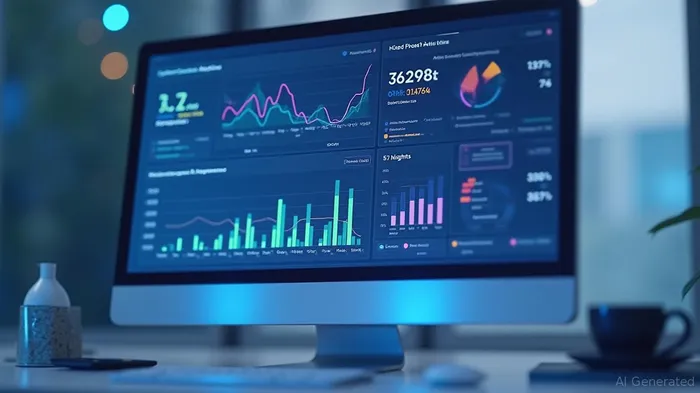AI-Driven Content Optimization: The New Frontier for SEO and Digital Dominance
The digital landscape is undergoing a seismic shift as AI-driven content optimization tools reshape how businesses compete in SEO and digital marketing. With search engines increasingly relying on AI to summarize results and users demanding faster, more personalized answers, companies that fail to adopt these tools risk being left behind. Recent data reveals that AI now appears in 47% of Google search results, with 58% of informational queries triggering AI-generated summaries as top results. This trend is not just about convenience—it's a fundamental transformation of how information is consumed, and investors must pay close attention to the firms leading this charge.

The AI SEO Growth Surge: Stats and Market Momentum
The numbers are staggering. The global AI content marketing industry is projected to grow from $2.4 billion in 2023 to $17.6 billion by 2033 at a 25.68% CAGR, driven by the rapid adoption of tools like ChatGPT, which has already amassed 10 million monthly mobile app downloads since its 2022 launch. Meanwhile, 60% of searches are now completed without users clicking through to websites—a phenomenon known as “zero-click searches”—as AI provides instant answers. For businesses, this means traditional SEO strategies must evolve to align with AI's dominance, or risk losing visibility and traffic.
How AI Tools Deliver Competitive Advantage
The shift to AI isn't just about keeping up—it's about gaining measurable edges in engagement, conversion, and traffic. Key advantages include:
- Speed and Scalability: 70% of companies report faster content production using AI tools like ChatGPT, enabling brands to produce high-quality, search-optimized content at a fraction of the time and cost of manual processes.
- Personalization at Scale: 62% of organizations use AI for data analysis to create hyper-targeted campaigns, while 56% leverage it to tailor messaging for diverse audiences.
- Hybrid Content Excellence: Combining AI efficiency with human creativity yields the best results. Hybrid approaches—where AI drafts content and humans refine it for semantic richness and E-E-A-T (Experience, Expertise, Authoritativeness, Trustworthiness)—outperform purely manual or AI-driven methods. For instance, hybrid articles achieve 14% higher featured snippet rankings than human-only content.
Case studies underscore this power. A SE Ranking experiment found that AI-generated articles on an established domain (Domain Rating 78) secured three top-10 rankings, including a #1 position, and garnered 14 editorial backlinks in four months—a testament to AI's ability to scale quality content. However, new domains struggled, highlighting the importance of existing authority for AI-driven SEO success.
The Risks and the Playbook for Investors
Despite its promise, AI content isn't flawless. Human-written content still outperforms in semantic richness and user engagement, with 18% lower bounce rates and 41% longer session durations. AI also faces hurdles in temporal relevance (28% inaccuracy in data) and lack of verifiable case studies (only 12% of AI content includes them). Investors should prioritize companies that address these gaps through:
- Hybrid Workflows: Firms like OmniSEO™, which focus on “search everywhere optimization,” integrating both traditional and AI search engines, are well-positioned.
- Technical SEO Mastery: Companies that emphasize schema markup (boosting CTR by 33%), Core Web Vitals compliance (LCP < 2.5 seconds), and entity graph alignment (27% higher rankings) will thrive.
- Brand Authority Plays: Look for firms leveraging authentic brand mentions over backlinks—a growing priority as search engines like Google's “Genesis” update penalize low-quality AI content.
Investment Opportunities: Where to Look
The AI content optimization space is ripe for investors to find undervalued gems. Key criteria to evaluate include:
- Market Share and Partnerships: Companies with deep ties to platforms like ChatGPT or Google's AI tools may have first-mover advantages.
- Hybrid Tool Offerings: Firms that blend AI with human oversight (e.g., tools for keyword research, content drafting, and E-E-A-T compliance) are likely to outperform.
- Data-Driven Provenance: Look for firms emphasizing entity graph alignment and schema markup—technical SEO strengths that AI alone can't replicate.
Current leaders include Semrush (which recently expanded its AI-driven content offering) and Bright Data, but smaller players like Ahrefs and Moz are also worth watching. A visual analysis of Semrush's stock price and revenue growth since 2022 reveals a trajectory aligned with AI adoption trends, making it a bellwether for the sector.
Conclusion: The Hybrid Future of SEO
The rise of AI-driven content optimization tools is undeniable, but success in this era requires a balanced approach. Investors should focus on companies that marry AI's speed and scalability with human expertise in storytelling, case studies, and brand authority. As Google's algorithms increasingly prioritize semantic richness and user intent alignment, firms that can deliver both will capture disproportionate gains. For those willing to act now, this niche offers a compelling opportunity to profit from the next wave of digital transformation.
Tracking the pulse of global finance, one headline at a time.
Latest Articles
Stay ahead of the market.
Get curated U.S. market news, insights and key dates delivered to your inbox.



Comments
No comments yet